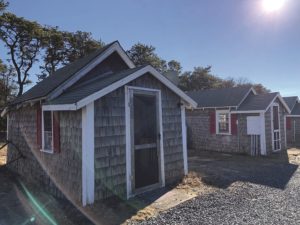TRURO — Before Covid-19, summer evenings at 104 Shore Road hummed with restaurant-goers at Terra Luna, and, later in the night, seasonal workers would return to the clapboard cottages on that same property. Officially, this row of housing units goes by the name Prince of Whales. But the workers who lived there summer after summer nicknamed it “Little Jamaica,” recalled Janet “Big Mama” Hewitt.
Hewitt left Jamaica in 2001 and lived at the Prince of Whales for 16 or so years. She’d spend her days sweeping floors and scrubbing dishes at Provincetown’s Post Office Cafe and Tin Pan Alley. After clocking out, she’d head back to North Truro, pull out a chair, and sit under the stars, shooting the breeze with her neighbors. They’d often cook together and chat while doing loads of laundry outside. They’d play music on people’s birthdays.
“It reminded me of Jamaica,” Hewitt said. “God, I miss it so much.”

For the past two years, the Prince of Whales has been vacant — a ghost town compared to those lively Little Jamaica days. Mattresses are now scattered about the lot, lying flat on the ground and slumped against cottage walls.
The cottage colony is scheduled for a makeover soon. On Dec. 20, 2021, the Lexvest Group, a real estate development and investment company based in Maynard, purchased 104 Shore Road from Fred Sateriale for $1,375,000. Lexvest has renovated other cottage colonies up and down Shore Road, converting them into condominiums, including those at East Harbour, the Shoreline, and Sutton Place. The company also runs the Cape Colony Inn and Breakwater Hotel in Provincetown.
The 26 units in the Prince of Whales’s 17 cottages and two larger buildings will have one of three uses: housing for Lexvest’s own employees, housing for others’ employees, and rentals for vacationers. How these units will be divvied up among these categories has not yet been determined, said Eric Shapiro, Lexvest’s chief executive officer.
“Our foremost goal is to provide housing for the workforce that we need to operate our business, and if we can provide housing for others, we’ll do that,” Shapiro said. “But it’s a balancing act because Fred, as any owner does, had a financial number that he needed to receive in order to sell this property. And in order to make that work, it’s a balance of providing workforce housing and some vacation rentals.”
Shapiro said he had not figured out the maximum potential occupancy yet, but “the general rule of thumb,” he said, “is two people per bedroom.”
Workforce Housing
Shapiro’s Provincetown and Truro roots date back to his grandfather, who fished here in the 1930s and 1940s and eventually moved his family to the Cape. Shapiro summered here with his children.
For years, he resisted going into real estate on the Outer Cape. “I was trying to avoid it because it was a place where I came to relax and not work,” he said. “But often I felt like a doctor driving by a bleeding patient. I felt like I had the tools and the ability to improve the neighborhood and community.”
The Prince of Whales, he said, has an up-to-code septic system. The property’s electrical system is “in pretty good shape,” Shapiro said. Next up for Lexvest is working through a pile of “deferred maintenance” to-dos: cleaning up a fair amount of rot, replacing broken windows, fixing roofs, and “beefing up” some structural components.
His goal is to have units available for the 2022 season, when Lexvest employs up to 50 people to operate the company’s more than 100 hotel rooms and 30 rental properties. “These people need a place to live that’s affordable,” Shapiro said. “And unfortunately, the area doesn’t have many options, so we’re trying to manage and deal with that ourselves.”
Lexvest, in the past, has set aside some of its housing stock — “at quite a cost,” Shapiro added — for its own workers. These include spaces in the company’s hotels and rentals.
“That’s why we decided to purchase the Prince of Whales,” he said. “There are 26 units that will allow us to control our destiny with respect to workforce housing. We’re not planning on tearing down units to build luxury units.”
Terra Luna, meanwhile, will “continue to operate,” Shapiro said. “No changes expected.”
An Ode to ‘Little Jamaica’
Sateriale took over the 104 Shore Road property in 1986, just as the H-2B visa program began. The same year, state Sen. Julian Cyr’s parents moved their restaurant Adrian’s to where Terra Luna is today. They operated it until 1992.
“The first H-2B visa employees who worked in my parents’ restaurant actually lived at the Prince of Whales during the summers,” Cyr told the Independent.
Rent at the Prince of Whales, Hewitt recalled, was originally $60 per week, but Sateriale gave tenants leeway if money was tight, particularly in the springtime when businesses were revving back up. “No rush,” Hewitt remembered him telling her neighbors. “When you have the money, you can pay me first month’s rent.”
Sateriale, who sold the Breakwater Hotel to Shapiro, declined to comment for this article.
Eventually, as the repairs and maintenance on the property began to mount, Sateriale needed to bump up the rent to $100 per week. “But we had no problem with that,” Hewitt said. “He took good care of us.”
Shapiro declined to provide an estimate of monthly rates at the Prince of Whales when it is available for occupancy.
Last season, with the cottages closed down, Hewitt went from paying $400 monthly in Little Jamaica to $500 monthly to sleep on a couch. Currently, she’s working in New York City, but she hopes to circle back to Commercial Street this summer — if she can find a place to live.
